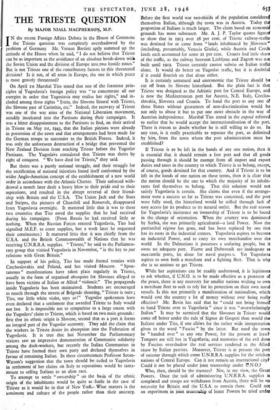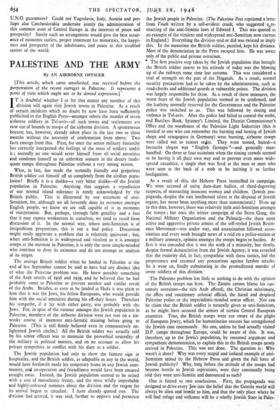THE TRIESTE QUESTION
By MAJOR NIALL MACPHERSON, M.P.
N the recent Foreign Affairs Debate in the House of Commons
I
the Trieste question was completely overshadowed by the problem of Germany. Mr. Vernon Bartlett aptly summed up the attitude of the House when he said, " I do not believe that Trieste can be as important as the avoidance of an absolute break-down with the Soviet Union and the division of Europe into. two hostile zones." But is not Trieste one of the contributory factors to this threatened division? Is it not, of all areas in Europe, the one in which peace is most gravely threatened?
On April 1st Marshal Tito stated that one of the foremost prin- ciples of Yugoslavia's foreign policy was " to concentrate all our energies in order that Yugoslavia may realise her rights," and in- cluded among these rights " Istria, the Slovene littoral with Trieste, the Slovene part of Carinthia, etc." Indeed, the recovery of Trieste was one of the war aims of the National Liberation movement, steadily inculcated into the Partisans during heir campaigns. It was a bitter disappointment to the Partisans to find, on their arrival in Trieste on May 1st, 1945, that the Italian patriots were already in possession of the town and that arrangements had been made for the German troops to surrender to the British-Forces. Indeed, it was only the unforeseen destruction of a bridge that prevented the New Zealand Division from reaching Trieste before the Yugoslav Partisans. The Yugoslairs considered that Trieste was theirs by right of conquest. ." We have died for Trieste," they said.
But theirs was a purely national struggle, and their struggle for the rectification of national injustices found itself confronted by the wider Anglo-American concept of the establishment of a new world order in accordance with the-Atlantic Charter. Their enforced with- drawal a month later dealt a heavy blow to their pride and to their aspirations; and resulted in the abrupt reversal of their friend- ship with Britain and the U.S.A. The Union Jack and the Stars and Stripes, the pictures of Churchill and Roosevelt, disappeared from Yugoslavia overnight. It mattered little that it was to these two countries that Tito owed the supplies that he had received during his campaigns. (From Russia he hscl, received little or nothing. When the Russian Forces entered Yugoslavia, Tito had signalled M.E.F. to cease supplies, but a week later he requested their continuance.) It mattered little that it was chiefly from the U.S.A. and the British Commonwealth of Nations that he was receiving U.N.R.R.A. supplies. " Trieste," he said to the Parliamen- tary group that visitied Yugoslavia in November, " is the key to our relations with Great Britain."
In support of his policy, Tito has made ,formal treaties with Czechoslovakia and Poland, and has visited Moscow. " Spon- taneous" manifestations have taken place regularly in Trieste, usually in the form of organised obsequies for Slovenes alleged to have been victims of Italian or Allied " violenee." The propaganda inside Yugoslavia has been maintained. Students are encouraged to march through the streets of Belgrade shouting, " Trieste is ours ; Tito, our little white violet, says so!" Yugoslav spokesmen have even-declared that a settlement that awarded Trieste to Italy would not last. It is impossible not to sympathise to a large extent with the Yugoslays' claim to Trieste, which is based on two main grounds : first that its ethnic origin is Slovene, second that as a port it forms an integral part of the Yugoslav economy. They add the claim that the workers in Trieste desire its absorption into the Federation of Yugoslavia. It is true that last November the Parliamentary visitors saw an impressive demonstration. of Communist solidarity among the dock-workers, but recently the Italian Communists in Trieste have formed their own party and declared themselves in favour of remaining Italian. In these circumstances Professor Seton- Watson's suggestion that the town should be; ceded to Yugoslavia in settlement of her claims on Italy to reparations would be tanta- mount to selling Italians to an alien race.
To attempt to settle " ownership " on the basis of the ethnic origin of the inhabitants would be quite as futile in the case of Trieste as it would be in that of New Yodt.u, What matters is the sentiment and culture of the people rather than their ancestry.
Before the first world war two-thirds of the population consld themselves Italian, although the town was in Austria. Today th proportion of Italians is much larger. The claim based on economi grounds has more substance. Mr. A. J. P. Taylor quotes figured to show that in 1913 over 28 per cent. of Trieste railway-craft was destined for or came from " lands inhabitated by Slovenes'
(including, presumably, Venezia Giulia), while Austria and Czech lands each accounted for some 21 per cent. Croatia had little share
of the traffic, as the railway between Ljubljana and Zagreb was not built until 1919. Trieste certainly cannot subsist on Italian traffic alone. It would do better on Yugoslav traffic, but it is doubtful if it could flourish on that alone either.
It is certainly unnatural and uneconomic that Trieste should be cut off from its Slovene hinterland. But the plain fact is that Trieste was designed as the Adriatic port for Central Europe, and is now the Mediterranean port for Austria, N.E. Italy, Czecho- slovakia, Slovenia and Croatia. To hand the port to any one of those States without guarantees of non-discrimination would be
not only to abuse it but to put one more obstacle in the way of Austrian independence. Marshal Tito stated in the exposé referred to earlier that he would accept the internationalisation of the port. There is reason to doubt whether he is still willing to do so. In any case, is it really practicable to separate the port, as delimited by him, from the town where the port administration must be established?
If Trieste is to be left in the hands of any one nation, then It is essential that it should remain a free port and that all goods
passing through it should be exempt from all import and export
duties and taxes in the country to which Trieste is to belong, except, of course, goods destined for that country. And if Trieste is to be
left in the hands of one nation on these terms, then it is clear that the nation should be the one to which the majority of its inhabi- tants feel themselves to belong. That this solution would not satisfy Yugoslavia is certain. She claims that even if the arrange- ment were a success so far as Trieste was concerned, and the port were fully used, the hinterland would be stifled through lack of easy access fpr its produce to its natural outlet. But the real reason for Yugoslavia's insistence on ownership of Trieste is to be found in the, change of orientation. When the country was cOminated by Serbia, she was primarily agricultural—a land Power. Now the patriarchal regime has gone, and has been replaced by one that has its roots in the industrial centres. Yugoslavia aspires to become an industrial Power, and to carry its own merchandise over the world In the Dalmatians it possesses a seafaring people, but it owns no adequate port. Fiume and Dubrovnik are inadequate as mercantile ports, let alone for naval purpos:s. Yet Yugoslavia aspires to own both a merchant and a fighting fleet. That is why she is so anxious to get Trieste.
While her aspirations can be readily understood, it is legitimate to ask whether, if U.N.O. is to be made effective as a protector of
the peace, there is any necessity for smaller nations wishing to own a merchant fleet to seek to rely for its protection on their own naval vessels. Is this not primarily a manifestation of nationalism, which would cost the country a lot of money without ever being really effective? Mr. Bevin has said that he "could not bring himself to hand Trieste over to Yugoslavia" since it was "overwhelmingly Italian." It may be surmised that the Slovenes in Trieste would come off better under the rule of Signor de Gasperi than would the Italians under Tito, if one allOws for the rather wide interpretation given to the word " Fascist "' by the latter. But need the town be " handed over " to any one Power, for the present at least? Tempers are still hot in Yugooilavia, and memories of the evil done
by Fascists overshadow the real services rendered to the Allied cause by Italian patriots. Moreover, Trieste is at present the port of succour through which come U.N.R.RA. supplies for the stricken nations of Central Europe. Can it not remain an international city? Could it not be placed under joint trusteeship under II.N.0.?
Who, then, should be the trustees? Not, in my view, the Great Powers. Once the task of administering U.N.R.R.A. supplies is completed and troops are withdrawn from Austria, there will be no necessity for Britain and the U.S.A. to remain there. Could not an experiment in joint trusteeship of lesser Powers be tried under U.N.O. guarantees? Could not Yugoslavia, Italy, Austria and per- haps also Czechoslovakia undertake jointly the administration of this common asset of Central Europe in the interests of peace and prosperity? Surely such an arrangement would give the best assur- ance of economic outlets, proper treatment for minorities, the happi- ness and prosperity of the inhabitants, and peace in this troubled corner of the world.































 Previous page
Previous page